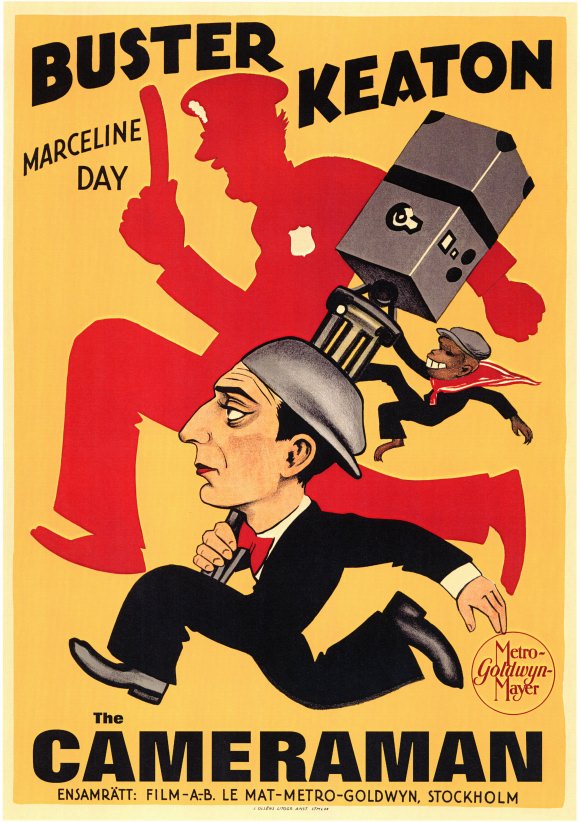

Their meeting, in a crowded mob of reporters, is one of the finest depictions of ‘love at first sight’ I’ve ever seen.

It’s not particularly well developed in the script, but Keaton does so much with his glances at Sally. Most notably, he sells the film’s central romance superbly. Not only does he pull off the slapstick, knockabout routines he’d honed from childhood, performing with his parents as a vaudeville act, but he demonstrates his fine dramatic acting chops too. Keaton’s physical performance skills are honed to perfection here. So the film became his last true silent feature ( Spite Marriage was somewhere in-between – see below) and proved to be a wonderful showcase for what made him one of the top three legends of the silent-comedy era, alongside Chaplin and Lloyd. The ‘talkies’ were all the rage during the production of The Cameraman and Keaton was keen to make the move to this new format, but MGM were a bit apprehensive about jumping on the bandwagon, other than for musicals. A hot tip about a suspected incident brewing in Chinatown might turn the tide for the lovelorn fellow though.
Buster keaton the cameraman how to#
He doesn’t know how to use this kit straight away though and his rival tries to scupper his plans, so, as you’d expect, Buster makes a pig’s ear out of everything.
Buster keaton the cameraman movie#
Eager to impress her, particularly after seeing her being hit on by manly cameraman co-worker Harold (Harold Goodwin), Buster trades in his tintype for a budget movie camera and tries to grab a big scoop for MGM. The Cameraman sees Keaton star as a tintype photographer who falls head over heels in love with a woman named Sally (Marceline Day), who works in the MGM newsreel department. Starring: Buster Keaton, Marceline Day, Harold Goodwin, Sidney Bracey, Harry Gribbon Screenplay: Clyde Bruckman, Lew Lipton, Joseph Farnham I gave both a watch and my brief thoughts on them follow.ĭirector: Edward Sedgwick, Buster Keaton (uncredited) It’s regarded among the best of Keaton’s work and Criterion are releasing it on Blu-ray with his follow-up Spite Marriage as an added bonus film. Much like what happened with The Marx Brothers though, Keaton’s first film with MGM was a triumph that combined the best of his talents with the gloss and resources of the studio, before the standard declined as the lack of independence and creative control took its toll. So his great work remains from his fruitful 20s period. At this time and in later years he carried on performing, but largely just in cameo roles, in shorts and on TV. He did return to MGM in the early 40s, after his personal life settled down, but only as a gag-writer. They paired him with mismatched co-star Jimmy Durante, whose style was more aggressive than Keaton’s, so he stole the limelight and didn’t play off his co-star very well.Īs Keaton grew less happy with his work at MGM, he hit the bottle harder and eventually was fired, ironically after the film What, No Beer? in 1933. Plus, MGM didn’t know how best to use Keaton as a performer. For one, everything had to be meticulously planned and on paper for MGM, whereas Keaton used to improvise and come up with new ideas on set. Personal problems with an ongoing break-up/divorce and alcoholism were also major factors, but MGM didn’t know how best to handle Keaton’s talent. MGM only saw Keaton as an actor, not a filmmaker, which was perhaps their biggest mistake and what led to the reduction in quality of his work after the move. At first, he saw this as a way to make bigger and better films with the budgets they could afford but, eventually, he described it as “the worst mistake of my life”. So, after a short while, when offered an hefty contract at Hollywood’s then biggest studio, MGM, Keaton took it. However, when some of these bold and often quite expensive films failed to deliver at the box office, most notably The General, his distributor, United Artists, grew worried and began to restrain Keaton a little. This led to some ambitious and groundbreaking work, such as Sherlock Jr. On top of starring in numerous shorts and features during this time, he would often devise, write and direct them. In Buster Keaton’s heyday, between 19, he had enjoyed relative independence over his productions.


 0 kommentar(er)
0 kommentar(er)
